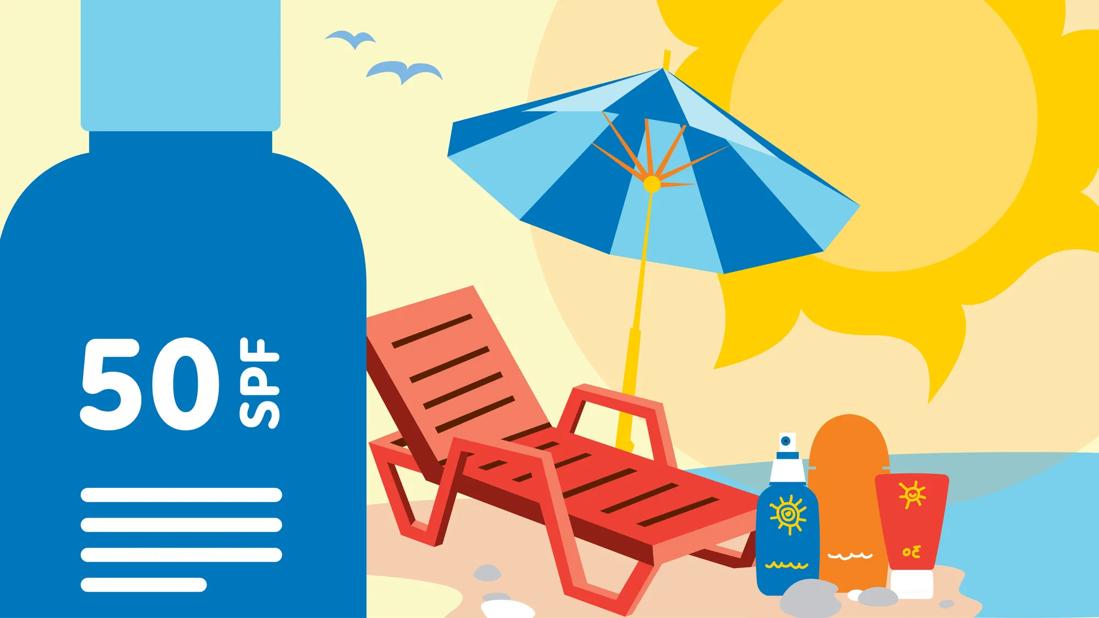SPF stands for ‘sun protection factor’ — it’s a measure of how much protection you’re getting before a sunburn is possible

Even with the simplest skin care routine, sunscreen is the one product you should never leave home without. Dermatologists like Melissa Piliang, MD, recommend wearing sunscreen every day.
Advertisement
Cleveland Clinic is a non-profit academic medical center. Advertising on our site helps support our mission. We do not endorse non-Cleveland Clinic products or services. Policy
But what is the best sunscreen? And which SPF should you buy? Before you head to the store, let’s answer these (and other) burning questions.
Sunscreens come in gels, creams, powders and sprays that you apply directly to your skin. The active ingredients in sunscreen work to filter out the ultraviolet (UV) rays before they’re absorbed and cause any skin damage.
UV rays — which come from the sun, tanning beds and indoor fluorescent lighting — can cause skin cancer and other signs of aging like wrinkles, dark spots and sagging.
“Regular sunscreen use reduces and prevents these effects,” says Dr. Piliang.
The sun protection factor (SPF) listed on sunscreen labels is an important piece of information. SPF tells you how much protection you’re getting from UVB (ultraviolet B radiation) rays and sunburn. The lower the SPF, the less protection you have. So, a sunscreen with SPF 15 offers more protection than SPF 8. And SPF 30 gives you 30 times more protection than if you didn’t wear any sunscreen at all.
“For days when you’re outside for only short periods, you can get away with a minimum of SPF 15,” notes Dr. Piliang. “But if you’re going to be outside for more than a few minutes, choose at least SPF 30.”
Advertisement
Although higher SPFs offer more protection from UVB rays, they don’t offer any protection from UVA (ultraviolet A radiation) rays. That’s why you’ll want to look for broad-spectrum sunscreens that can protect you from both. And while there’s ongoing debate on whether mineral or chemical sunscreens are better for you, it’s best to avoid aerosol sunscreens, as several have been recalled in recent years because of benzene contamination.
Studies have shown that SPF 100 sunscreens provide the most protection, but they can also give you a false sense of security if you’re not using it enough or in all the right places. Any broad-spectrum sunscreen with an SPF of 15 or higher can offer you a good amount of protection as long as you reapply it:
The reason? Factors like sweat and water can make your sunscreen wear off faster.
“Daily use of sunscreen that’s SPF 15 or higher can reduce your risk of melanoma, the deadliest form of skin cancer, by 50%,” stresses Dr. Piliang. “It can also decrease your risk of the most common skin cancer, squamous cell carcinoma, by 40%.”
Also, check that you’re not using expired sunscreen or sunscreen that’s been stored improperly — these can make your sunscreen’s SPF less effective. And remember, SPF isn’t the only thing that can protect you from the sun.
“No sunscreen can block all UV rays,” clarifies Dr. Piliang. “Good sun protection should also include seeking shade and wearing sun-protective clothing, wide-brimmed hats and sunglasses. Enjoy the sun — but be smart about how much exposure you’re getting.”
Advertisement

Sign up for our Health Essentials emails for expert guidance on nutrition, fitness, sleep, skin care and more.
Learn more about our editorial process.
Advertisement

Several conditions, like vitiligo and fungal infection, can cause a loss of pigmentation, leading to white spots or patches on your skin

This cooling gel can help soothe sunburned skin, but it can’t cure the burn

You know it’s not good if you’ve been holding onto it for more than three years or if it’s changed in color, consistency or smell

Look for a UPF rating of 50+ for optimal protection against UV rays

A sunburn will leave you itchy and red, while sun poisoning can feel like an allergic reaction

A cool shower, aloe vera gel, anti-itch treatments and cool compresses can provide fast sunburn relief

This ‘poisoning’ is actually a severe sunburn that seems similar to an allergic reaction

When outside, protect your skin from damaging UV rays with a fresh layer of sunscreen at least once every two hours

Even small moments of time outdoors can help reduce stress, boost mood and restore a sense of calm

A correct prescription helps your eyes see clearly — but as natural changes occur, you may need stronger or different eyeglasses

Both are medical emergencies, but they are very distinct events with different causes